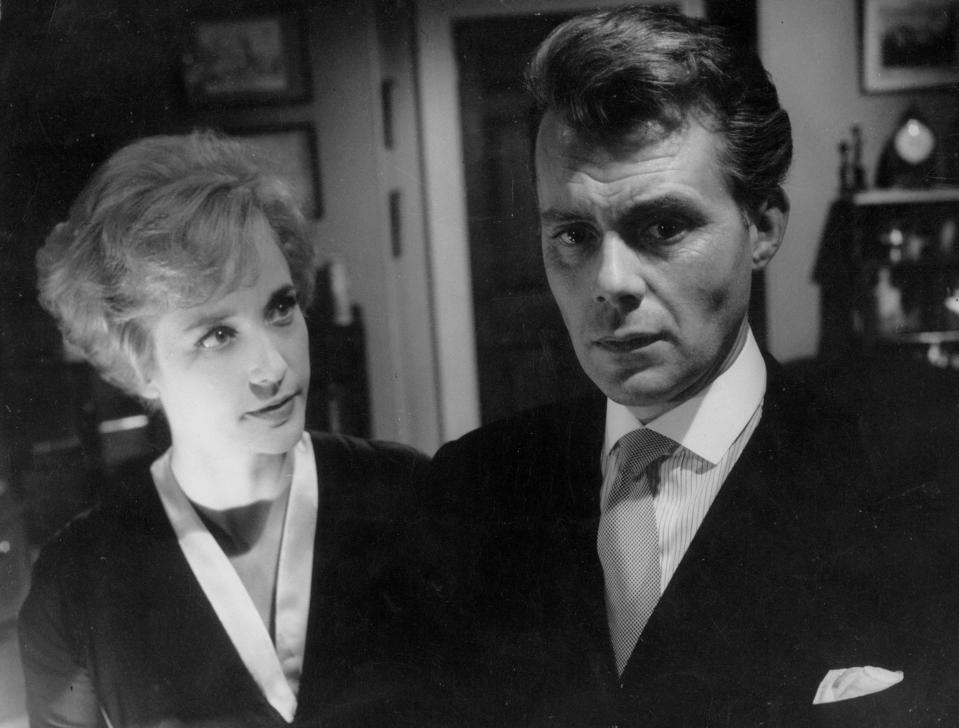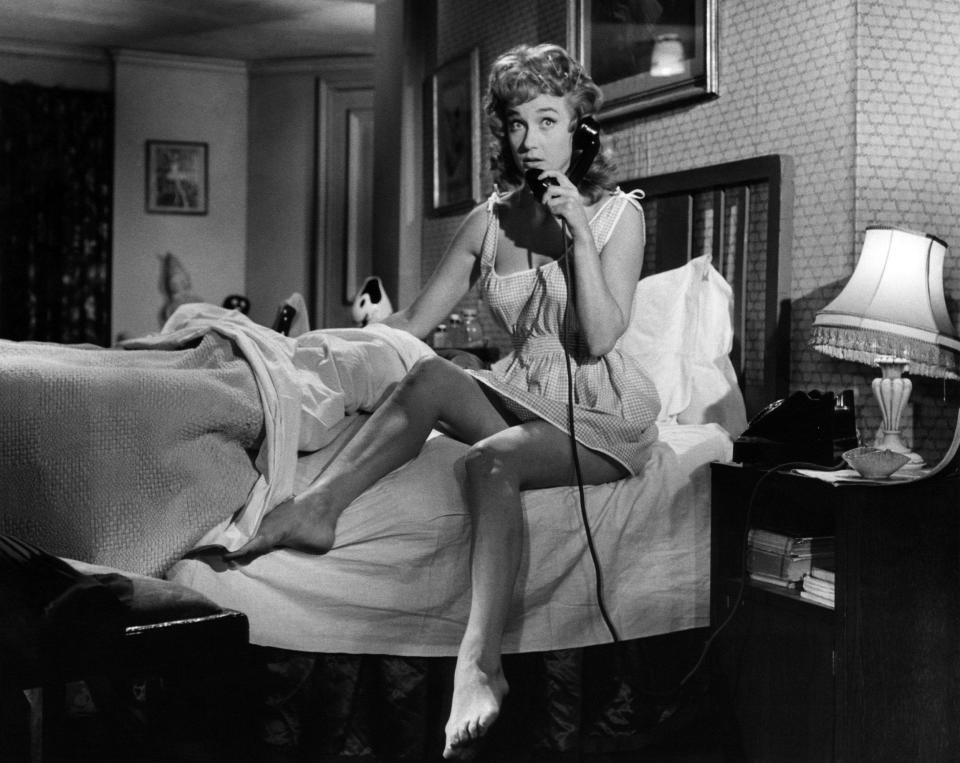Sylvia Syms, veteran British actress who made her name in films including Ice Cold in Alex and Victim – obituary

- Oops!Something went wrong.Please try again later.
- Oops!Something went wrong.Please try again later.
- Oops!Something went wrong.Please try again later.
- Oops!Something went wrong.Please try again later.
Sylvia Syms, the actress, who has died aged 89, was one of the brightest stars of British cinema in the 1950s, when she specialised in sassy, stubborn, heroines in films from the classic war drama Ice Cold in Alex (1958) to Victim (1961); in later years her roles ranged from Margaret Thatcher and the Queen Mother to Olive, the no-nonsense dressmaker in EastEnders.
Sylvia Syms shot to stardom playing Anna Neagle’s stroppy daughter in the 1956 box-office hit My Teenage Daughter, and was hailed as the most beautiful star of her generation when she appeared in Ice Cold in Alex as an Army nurse who joins a group of British soldiers (Harry Andrews, Anthony Quayle and John Mills) in an arduous trek across the deserts of North Africa during the Second World War.

Other early triumphs included the marriage-breaking secretary in Woman In A Dressing Gown (1957), for which she won a Bafta nomination; the earnest sister of a young tearaway forced to yield to Herbert Lom’s lustful desires in the sentimental crime drama No Trees In The Street (1959), which earned her another Bafta nomination; a stripper girlfriend in Expresso Bongo (1959), a send-up of ’50s British pop, memorable for her (dubbed) rendition of a song called Nausea that rhymed “Meistersingers” with “shyster singers”; and as the white daughter daring to marry a Jamaican in Flame In The Streets (1961).
Other notable credits included Conspiracy of Hearts (1960) and The World of Suzie Wong (1960).
She insisted on taking the role of the loving wife of a barrister (Dirk Bogarde) forced to confront his homosexuality in Victim after several other actresses had rejected the role. The film was far ahead of its time in tackling the taboo of homosexuality, and played an important part in helping to change social attitudes. “I’d always been involved in politics,” she recalled, “and I was appalled by the ridiculous attitude to gay people. Of course I’d met a few by then.”
But Sylvia Syms never made any money out of these early appearances. She had signed a contract with Associated British Films for a weekly fee of £30 (she later discovered they had been hiring her out for £1,000 a week – with no royalties). When many of her early films were reissued in a “British Greats” series, she received a postcard from Bogarde: “Isn’t it great to be great? Wouldn’t it be great if they gave us a penny for each showing?”
And when the National Film Theatre ran a retrospective of her work in 2004, she confessed that it merely reminded her that she had been paid a pittance for her early films.
Nor did her fame endure: her talent for vanishing inside the skin meant, as she put it, that she was never “instantly recognisable as me”. As it was, she was frequently mistaken for the actress Sheila Sim, the wife of Richard Attenborough, somewhat to her chagrin – “She’s even older than me!” she pointed out.

Early on, Hollywood came calling, but Sylvia Syms turned them down – “The thought of having to be beautiful all the time frightened me.” Instead, she chose the comparative penury of life as a British actress and marriage, aged 22, to her childhood sweetheart.
Sylvia Syms was born in London on January 6 1934. Her father, Edwin, was a trade unionist and civil servant. She had a difficult childhood. While she was evacuated during the Second World War with her older brother and sister, her mother Daisy was hit during an air raid and suffered a severe head injury, later taking her own life when her daughter was 12. Sylvia described her death as a “loss that was not properly dealt with at the time” which resulted in a near-breakdown.
Two years later her father remarried and it was her stepmother Dorothy who did the most to try to help Sylvia through her difficulties, sending her to a therapeutic centre in the West Country, though she continued to be afflicted by bouts of depression throughout her life.
After training at Rada, Sylvia Syms began her career as an assistant stage manager before landing a small role as a princess in Shaw’s The Apple Cart, with Noël Coward, in 1953. She understudied Mai Zetterling, cut her rep teeth in Bath and Eastbourne, appeared in Charley’s Aunt with John Mills and starred with Tony Britton in The Romantic Young Lady. She was soon talent-spotted by Associated British Films and signed to a contract, starting with My Teenage Daughter.
Many of the films in which she appeared, such as The Moonraker (1958) and Bachelor of Hearts (1958), were run-of-the-mill stuff. She played girls in uniforms and nuns, and a “virgin” in The Virgins of Rome (“A Thousand Tempting Beauties… they Fought Like Ten Thousand Unchained Tigers!”), a Cinecitta production during the filming of which she had to be rescued from the clutches of an amorous producer by Jack Palance – and cracked a vertebra while trying to perform a stunt.
Longing to settle down and start a family, Sylvia Syms married her childhood sweetheart Alan Edney, a businessman, when she was 22. Her first baby was stillborn and a daughter lived for only two days. She subsequently adopted a son and then gave birth to another daughter, the actress Beatie Edney.

She remained the family’s main breadwinner: “I’d be at the studios through the day working, then come home to Barnes to be with my husband,” she recalled. In the 1970s she appeared in a television sitcom, My Good Woman, with Leslie Crowther and Richard Wilson, and almost won a Bafta best actress award for The Tamarind Seed (1974, with Julie Andrews and Omar Sharif).
She had roles in numerous mini-series and Miss Marple stories, was a regular on Peak Practice for a couple of years, and took stage roles in Shakespeare, Osborne, Ibsen and Albee.
In 1989 she divorced her husband after she discovered he had been having an affair with a colleague. But she continued to keep herself busy, appearing on television in everything from Doctor Who and Casualty to The Jury and Rev, and played Margaret Thatcher three times – first on stage, then on television in Thatcher: The Final Days (ITV, 1991) and in Half the Picture (1994).

She was a headmistress in Shirley Valentine (1989); did an outstanding cameo turn as a blowsy landlady in Mike Hodges’s I’ll Sleep When I’m Dead (2003); was cast as the Queen Mother in Stephen Frears’s film The Queen (2006); and played a bad-tempered old woman forced into an old folks home by her family in Is Anybody There? (2009). Her most recent television appearance was in 2019 in Sally Wainright’s historical drama Gentleman Jack.
Sylvia Syms was appointed OBE in 2007.
In later life she became involved in running a company, Words and Music, that stages themed anthologies, with Jenny Agutter, Jenny Seagrove and the guitarist Simon James. She was also an active supporter and fundraiser for Age UK.
Her children survive her.
Sylvia Syms, born January 6 1934, died January 27 2023

